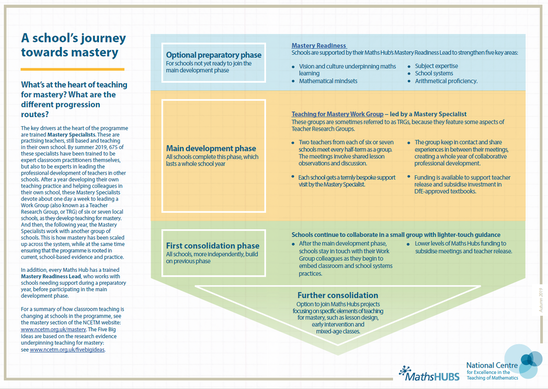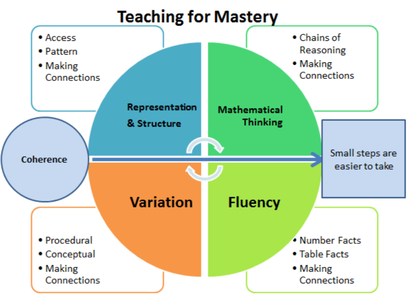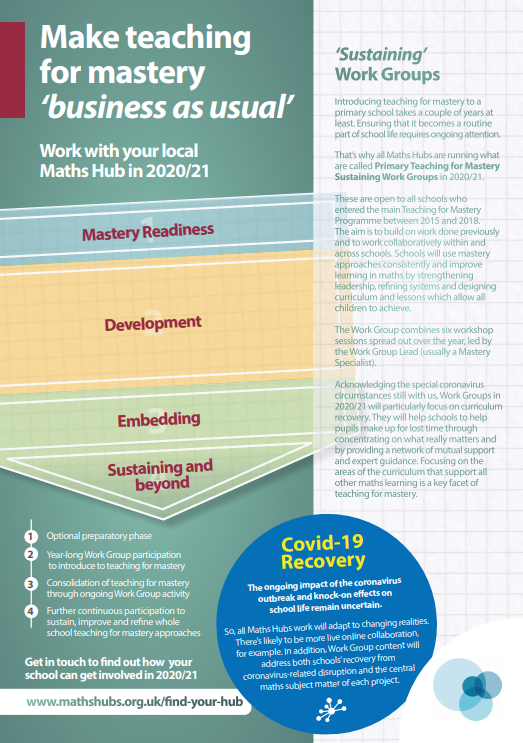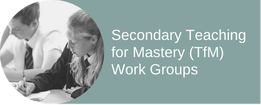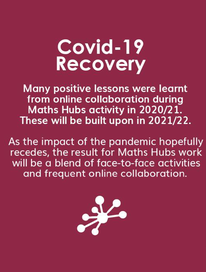Mastery...what is it?
Mastering maths means pupils acquiring a deep, long-term, secure and adaptable understanding of the subject.
The phrase ‘teaching for mastery’ describes the elements of classroom practice and school organisation that combine to give pupils the best chances of mastering maths.
Achieving mastery means acquiring a solid enough understanding of the maths that’s been taught to enable pupils to move on to more advanced material.
Teaching for mastery in maths demonstrates a number of characteristics that underpin the approach. Some are listed below, and more can be found in the NCETM’s 2016 paper ‘The Essence of Maths Teaching for Mastery’.
The Five Big Ideas underpin teaching for mastery in both primary and secondary schools.
The phrase ‘teaching for mastery’ describes the elements of classroom practice and school organisation that combine to give pupils the best chances of mastering maths.
Achieving mastery means acquiring a solid enough understanding of the maths that’s been taught to enable pupils to move on to more advanced material.
Teaching for mastery in maths demonstrates a number of characteristics that underpin the approach. Some are listed below, and more can be found in the NCETM’s 2016 paper ‘The Essence of Maths Teaching for Mastery’.
- It rejects the idea that a large proportion of people ‘just can’t do maths’.
- All pupils are encouraged by the belief that by working hard at maths they can succeed.
- Pupils are taught through whole-class interactive teaching, where the focus is on all working together on the same lesson content at the same time. This ensures that all can master concepts before moving to the next part of the curriculum sequence, allowing no pupil to be left behind.
- Procedural fluency and conceptual understanding are developed in tandem because each supports the development of the other.
The Five Big Ideas underpin teaching for mastery in both primary and secondary schools.
What is the Teaching for Mastery Programme?
The NCETM and Maths Hubs have been running the national Primary Teaching for Mastery Programme since 2015, and more recently secondary schools have also become involved with teaching for mastery.
In the first year, 136 schools from all over England each nominated a teacher to begin training as a Primary Mastery Specialist. The teachers were given a year’s intensive training in the principles of teaching for mastery, underpinned by its ‘Five Big Ideas’, and in professional development leadership. In the following year, they further developed teaching for mastery in their own schools. And they shared the approach with neighbouring schools by leading Teaching for Mastery Work Groups.
In each subsequent year, a new cohort of Primary Mastery Specialists has been trained, increasing the pool of specialists leading Work Groups of local schools. By summer 2019, more than 5,000 schools have participated in the Teaching for Mastery Programme. Hundreds of thousands of children are now benefitting from a changed experience of maths learning at school. The programme is open to all state-funded schools in England.
Secondary Mastery Specialists are now also being trained, and hundreds of secondary schools are starting to develop teaching for mastery approaches, especially at KS3.
More information about the Primary Teaching for Mastery Programme and its impact can be found in the NCETM’s Primary Teaching for Mastery progress report published in July 2019.
What else do I need to know about teaching for mastery?
If you are interested in the research behind teaching for mastery, there are a number of research papers available in the NCETM’s website page of Supporting Research, Evidence and Argument. For secondary school maths teachers and leaders, a document of Themes and Key Principles from December 2017 outlines some of the characteristics of teaching for mastery at secondary.
The NCETM provides a wide range of mastery resources including assessment materials, professional development materials, calculation guidance and marking guidance for both primary and secondary teachers.
The NCETM and Maths Hubs have been running the national Primary Teaching for Mastery Programme since 2015, and more recently secondary schools have also become involved with teaching for mastery.
In the first year, 136 schools from all over England each nominated a teacher to begin training as a Primary Mastery Specialist. The teachers were given a year’s intensive training in the principles of teaching for mastery, underpinned by its ‘Five Big Ideas’, and in professional development leadership. In the following year, they further developed teaching for mastery in their own schools. And they shared the approach with neighbouring schools by leading Teaching for Mastery Work Groups.
In each subsequent year, a new cohort of Primary Mastery Specialists has been trained, increasing the pool of specialists leading Work Groups of local schools. By summer 2019, more than 5,000 schools have participated in the Teaching for Mastery Programme. Hundreds of thousands of children are now benefitting from a changed experience of maths learning at school. The programme is open to all state-funded schools in England.
Secondary Mastery Specialists are now also being trained, and hundreds of secondary schools are starting to develop teaching for mastery approaches, especially at KS3.
More information about the Primary Teaching for Mastery Programme and its impact can be found in the NCETM’s Primary Teaching for Mastery progress report published in July 2019.
What else do I need to know about teaching for mastery?
If you are interested in the research behind teaching for mastery, there are a number of research papers available in the NCETM’s website page of Supporting Research, Evidence and Argument. For secondary school maths teachers and leaders, a document of Themes and Key Principles from December 2017 outlines some of the characteristics of teaching for mastery at secondary.
The NCETM provides a wide range of mastery resources including assessment materials, professional development materials, calculation guidance and marking guidance for both primary and secondary teachers.
